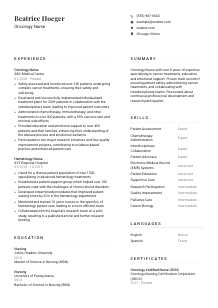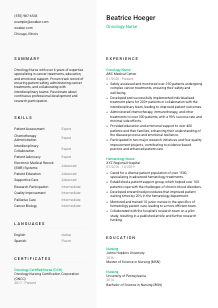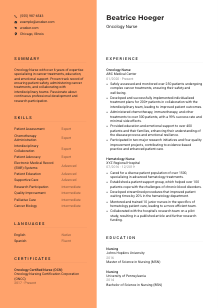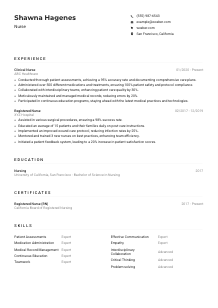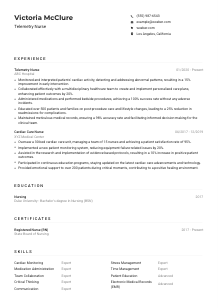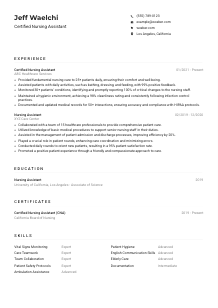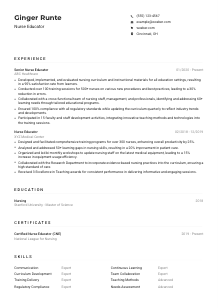Oncology Nurse Resume Example
Fighting cancer, but your resume feels weak? Explore this Oncology Nurse resume example, shaped with Wozber free resume builder. It demonstrates how you can blend your care expertise with job specifics, fashioning a career path as resilient as the patients you champion!
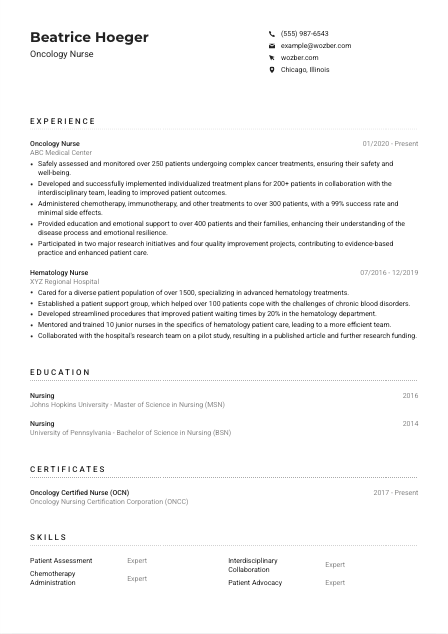
How to write an Oncology Nurse resume?
Hello to you, aspiring Oncology Nurse! In a realm where compassion meets critical care, your resume is a pivotal tool in journeying towards making a notable difference in the lives of those battling cancer. It's your mission statement, embodying your dedication and expertise. Crafting a resume that resonates with your passion and aligns seamlessly with your desired Oncology Nurse role is paramount.
Leveraging Wozber's free resume builder, this guide will navigate you through creating an ATS-compliant resume that not only meets the eye but also the heart of the hiring managers. Ready to turn your professional narrative into an inspiring success story? Let's tailor your resume into one that stands out in the realm of oncology nursing!
Personal Details
In the world of resumes, first impressions are everything. Your personal details are the initial handshake with potential employers, setting a professional and intriguing tone. Let's customize this section specifically for the Oncology Nurse position, ensuring it's not just an opener, but a compelling invitation to read on.
1. Your Name as Your Banner
Think of your name as the banner under which your professional achievements march. Use a clear and appealing font, making sure it's visible at a glance. Your name is the first thing a hiring manager will see, so make it count.
2. Job Title Precision
Below your name, proudly position the title you're aspiring for: 'Oncology Nurse'. This direct alignment with the job description signals your targeted intention and helps your resume to pass through the ATS resume scanner with flying colors.
3. Contact Essentials
When it comes to contact information, clarity and professionalism are key. Ensure your phone number is current and your email address reflects a professional demeanor, preferably a variation of your name.
4. Location Matters
"Located in or willing to relocate to Chicago, Illinois" - this requirement is clearly stated in the job description. Your address or willing relocation announcement in this segment further tailors your resume, gently reminding the hiring manager of your readiness.
5. A Professional Online Presence
Adding a LinkedIn profile or a professional portfolio link can provide a rich backdrop to your resume's story. Make sure these profiles are polished and consistent with the information on your resume, offering a deeper insight into your professional world.
Takeaway
Your personal details are more than just formalities. They're the first step in aligning your professional identity with the Oncology Nurse role you're aiming for. Tailored correctly, they pave the way for a strong first impression, making your resume a professional invitation that's hard to ignore. Use this section to set a confident, prepared tone for the rest of your resume.





Experience
Your experience section is where your resume truly gets to shine, showcasing your journey and contributions in the field of oncology nursing. It's your evidence of capability and compassion, two pillars of oncology nursing. Let's mirror the role's requirements within your experiences, presenting them in a way that speaks directly to your dream job.
- Safely assessed and monitored over 250 patients undergoing complex cancer treatments, ensuring their safety and well‑being.
- Developed and successfully implemented individualized treatment plans for 200+ patients in collaboration with the interdisciplinary team, leading to improved patient outcomes.
- Administered chemotherapy, immunotherapy, and other treatments to over 300 patients, with a 99% success rate and minimal side effects.
- Provided education and emotional support to over 400 patients and their families, enhancing their understanding of the disease process and emotional resilience.
- Participated in two major research initiatives and four quality improvement projects, contributing to evidence‑based practice and enhanced patient care.
- Cared for a diverse patient population of over 1500, specializing in advanced hematology treatments.
- Established a patient support group, which helped over 100 patients cope with the challenges of chronic blood disorders.
- Developed streamlined procedures that improved patient waiting times by 20% in the hematology department.
- Mentored and trained 10 junior nurses in the specifics of hematology patient care, leading to a more efficient team.
- Collaborated with the hospital's research team on a pilot study, resulting in a published article and further research funding.
1. Job Description as Your Blueprint
Start by dissecting the job description, marking each skill and experience required. These will be your guideposts as you list your previous roles, ensuring relevance and resonance with the Oncology Nurse position you're eyeing.
2. Chronology and Clarity
List your experiences in reverse chronological order, making sure each entry clearly displays your title, the institution's name, and the period of your engagement. This structured approach aids in ATS optimization and presents a clear trajectory of your professional growth.
3. Achievements That Speak Volumes
For each role, delve into accomplishments that mirror the job's demands, such as "Administered chemotherapy and immunotherapy to over 300 patients", showcasing your direct impact. This not only aligns with the job description but also highlights your expertise and dedication.
4. Quantify Your Impact
Numbers bring your contributions to life. Whether it's the number of patients you've cared for, treatment plans you've developed, or research initiatives you've participated in, quantifying your achievements makes your resume tangible and impressive.
5. Relevance Is Key
While it's tempting to list every experience, focus on those most relevant to oncology nursing. This streamlined approach ensures every word on your resume adds value, making it a focused narrative of your professional journey in oncology nursing.
Takeaway
Your experience section is a testament to your journey, dedication, and achievements in oncology nursing. Diligently tailored, it not only demonstrates your qualification but also your passion for the field. As you prepare this section, imagine speaking directly to the heart of your future employer, showcasing why you're not just a candidate, but the candidate for the job.
Education
In the rigorous field of oncology nursing, your educational background provides a vital foundation for your skills and knowledge. This section, while seemingly straightforward, has the power to reinforce your qualifications and dedication to continual learning. Let's sculpt your education section to reflect the precise demands of the Oncology Nurse role.
1. Essential Educational Credentials
The job description calls for a "Bachelor's degree in Nursing (BSN) from an accredited institution; Master's degree in Nursing (MSN) with a specialization in Oncology preferred." Ensure these credentials are prominently listed, matching the exact phrasing to optimize your resume for ATS.
2. Simple, Structured Layout
Maintain a clean and concise layout, listing your degree, field of study, educational institution, and graduation year. This straightforward format aids in both readability and ATS scanning.
3. Detail Your Specializations
Especially relevant for oncology nursing, detailing your specialization or any targeted coursework within your MSN or BSN programs aligns your academic background with the role's requirements, showcasing your focused career path.
4. Noteworthy Academic Achievements
If your academic journey includes honors, relevant extracurriculars, or projects that underscore your passion and capability in oncology nursing, highlight these. They add depth to your educational narrative, illustrating a commitment to excellence and continuous learning.
5. Advanced Education and Continuous Learning
In a field as dynamic as healthcare, continuous learning is vital. Mention any ongoing or completed advanced certifications, workshops, or seminars that enhance your knowledge and skills in oncology nursing, portraying an ongoing commitment to being at the forefront of your field.
Takeaway
Far from being just a list of qualifications, your education section is a portrait of your foundational knowledge and continuous dedication to excellence in oncology nursing. Tailoring this section to reflect the role's requirements not only affirms your qualifications but also your passion for the field. It's another step in weaving a compelling professional story that aligns with your career aspirations.
Certificates
Certificates are your badges of honor, showcasing your dedication to professional development and specialized skills in the intricate field of oncology nursing. This section is your opportunity to highlight your commitment to staying abreast with best practices and emerging trends. Let's ensure your certificates align in a way that enhances your candidacy for the Oncology Nurse position.
1. Identify Essential Certifications
Our job description mentions a preference for "Active Registered Nurse (RN) licensure with additional certification in Oncology Nursing (OCN/RN-BC) preferred." If you hold these certifications, they should be prominently listed to match the job's criteria, thus passing through the ATS filters effectively.
2. Prioritize Relevant Certifications
Focus on listing certifications that directly resonate with the oncology nursing field. This targeted approach ensures the hiring manager sees your most applicable qualifications first, reinforcing your expertise and readiness for the role.
3. Clear and Current Dates
For certifications with validity periods, clearly listing the acquisition or renewal dates assures the employer of your qualifications' current status. This transparency is key in demonstrating your commitment to maintaining professional standards.
4. Ongoing Professional Development
The healthcare landscape is ever-evolving, with continuous advancements in cancer treatment and patient care. Showcasing your initiative in pursuing recent certifications or ongoing education in oncology nursing reflects your dedication to staying at the cutting edge of your field.
Takeaway
Certificates in your resume serve as a testament to your specialized skills and ongoing commitment to professional excellence in oncology nursing. By strategically listing those most relevant to the role, you communicate not only your qualification but your enthusiasm for your professional journey. It's a nuanced touch that can significantly bolster your candidacy.
Skills
The Skills section is a concise showcase of your professional toolkit, offering a snapshot of your proficiency in both technical and soft skills vital for an Oncology Nurse. Here, we aim to create a focused list that speaks directly to the role's requirements, demonstrating how you're not just fit for the role but a standout choice.
1. Deciphering the Job Spec
Scrutinize the job description to identify both explicit and implied skill requirements. Skills such as "Proficiency in using electronic medical record (EMR) systems" or "Strong interpersonal, communication, and empathy skills" are directly transferable to your resume.
2. Tailor Your List
Align your skills with those listed in the job description, ensuring you cover both hard skills, like "Chemotherapy Administration", and soft skills, like "Patient Advocacy". This alignment not only passes ATS scans but also showcases your comprehensive skill set.
3. Clarity and Precision
Keep your skills list sharp and organized. Avoid overcrowding this section with every skill you possess. Instead, curate a list that encapsulates your expertise and aligns with the Oncology Nurse role's demands, ensuring each skill you note adds significant value.
Takeaway
Your skills section is a beacon that highlights your professional capabilities. In the journey to becoming an Oncology Nurse, showcasing a tailored mix of technical and interpersonal skills can significantly set you apart. Approach this section as a cogent summary of your professional toolbox, precisely aligned with the role you aspire to secure. It's not just about being qualified; it's about showing you're the right fit.
Languages
In the multicultural setting of healthcare, linguistic skills can be a significant asset, enhancing patient care and facilitating effective communication. While the job description might only list "English language competency," showcasing additional language skills can add an extra layer of appeal to your resume. Let's explore how to effectively present your linguistic prowess.
1. Align with Job Necessities
Firstly, validate your fluency in English as per the job requirement, positioning it prominently in your languages section. This meets the baseline expectation, setting a solid foundation for your linguistic profile.
2. Additional Languages as Assets
Beyond the mandatory English, listing other languages you're proficient in can significantly enhance your resume, especially if you are fluent in languages prevalent in the demographic area of your prospective job. For example, being fluent in Spanish in a community with a substantial Spanish-speaking population can be invaluable.
3. Honest Proficiency Levels
Clearly define your level of proficiency in each language, using terms like 'Native', 'Fluent', 'Intermediate', or 'Basic'. This authenticity helps set realistic expectations and showcases your honesty, a much-valued trait in the healthcare sector.
4. Tailoring to the Audience
While the emphasis in the job description may not be on bilingual or multilingual abilities, understanding the patient demographic you'll serve can guide which languages to highlight, implicitly demonstrating your preparedness for nuanced patient interactions.
5. Continuous Learning
If you're actively working to improve your proficiency in a second language, mention this ongoing effort. It shows a proactive mindset and a commitment to enhancing your ability to connect with and care for a broader patient base.
Takeaway
Multilingual abilities can significantly strengthen your resume, providing a competitive edge in the dynamic field of oncology nursing. By strategically showcasing these skills, you illuminate your capacity for empathetic patient care and effective communication in a diverse healthcare environment. It's not just about the languages you speak; it's about the connections they allow you to forge.
Summary
Your summary is the narrative heart of your resume, distilling your professional essence into a few powerful sentences. Here, we aim to craft a poignant opener that encapsulates your journey, skills, and passion as an Oncology Nurse, setting the tone for the detailed excellence that follows.
1. Capture the Role's Spirit
Anchor your summary in the core requisites and spirit of the Oncology Nurse position. Highlight your specialization and years of experience, emphasizing your dedication to patient care, such as "with over 6 years of expertise specializing in cancer treatments."
2. Integrate Your Unique Selling Points
Identify and weave in your key differentiators, spotlighting skills and achievements that align with the job requirements. Mentioning your proficiency in EMR systems or your participation in research initiatives showcases your multifaceted skill set.
3. A Celebration of Achievements
Present a concise list of your most significant accomplishments, whether it's the number of patients you've supported or innovative treatment plans you've developed. Let your impact in previous roles hint at the value you'll bring to the new position.
4. Brevity With a Punch
While detailing your expertise, keep the summary succinct. Aim for 3-5 sentences that invite the hiring manager to read on, intrigued and convinced of your fit for the Oncology Nurse role—a teaser of the professional excellence detailed in the rest of your resume.
Takeaway
A compelling summary is an artful blend of your professional identity and the nuances of the Oncology Nurse role you're pursuing. It sets a promising prelude to your detailed qualifications, inviting the hiring manager on a journey through your professional landscape. Let it reflect not only your expertise but also your passion for oncology nursing, making your resume not just seen, but felt.
Embarking on Your Oncology Nurse Challenge
Congratulations on mastering the art of tailoring your resume for the Oncology Nurse role! With these insights, powered by Wozber's free resume builder and its ATS-friendly resume template and ATS resume scanner, you're equipped to create an application that resonates with your passion and aligns with the job's requirements. Your resume is your advocate, articulately expressing your readiness and eagerness to contribute to the oncology nursing field.
Now, go forth and let your resume open the doors to a fulfilling career. The path ahead is promising, and your dedication is sure to shine through!

- Bachelor's degree in Nursing (BSN) from an accredited institution;
- Master's degree in Nursing (MSN) with a specialization in Oncology preferred.
- Active Registered Nurse (RN) licensure with additional certification in Oncology Nursing (OCN/RN-BC) preferred.
- Minimum of 3 years of direct patient care experience in an Oncology or Hematology setting.
- Proficiency in using electronic medical record (EMR) systems and other healthcare technology tools.
- Strong interpersonal, communication, and empathy skills with the ability to provide emotional support to patients and their families.
- English language competency is a must.
- Must be located in or willing to relocate to Chicago, Illinois.
- Assess and monitor patients undergoing cancer treatments, ensuring their safety and managing any potential side effects.
- Collaborate with the interdisciplinary team to develop and implement individualized treatment plans for patients.
- Administer chemotherapy, immunotherapy, and other medications as prescribed, while monitoring for any adverse reactions.
- Provide education and support to patients and their families, helping them understand the disease process and cope with emotional challenges.
- Participate in research initiatives, quality improvement projects, and ongoing professional development to ensure evidence-based practice and the best possible patient outcomes.





